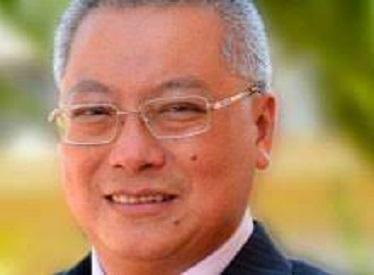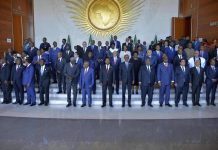Africa-Press – Mauritius. It seems that the economy has been somewhat forgotten, given all the attention and energy devoted by the Government, by the opposition and even by the vast majority of Mauritians to the events that have dominated the news these recent years: commission of inquiry on drugs and that on the former President of the Republic and their share of revelations, and other cases that have been brought to the public square.
Does this mean that there is no great concern for the Mauritian economy? Eric Ng Ping Cheun: In Mauritius, the population is only interested in the economy when the national budget is presented, once a year.
It is an event so publicized that people believe that the economy only works in relation to budgetary measures. Which is not the case. There are a lot of things going on every day that are unrelated to what’s in the budget.
They don’t make the headlines because people are less passionate about economics. The cases you mention have effectively eclipsed the economic issues. They are scandalous to the point of relativizing the seriousness of the latter. If they were just distractions, no one would care economically.
But they have anxiety-provoking effects on economic agents even though the business world needs serenity to face the challenges that are currently arising.
These challenges affect all major sectors of the Mauritian economy: the future of the sugar industry in the face of the plunge in the price of sugar on the international market, the competitiveness of the manufacturing industry, the impact of the rise in the price oil on tourism and aviation, the low technological intensity of our production methods, the upheavals due to artificial intelligence and robotics in banking and financial services, structural changes in Global Business, the rise in interest rates of interest in the United States, and the threat of a new recession in the world.
Each ministry in its field plays the firefighter, some belatedly, others clumsily. Among the authorities of financial services (Ministry, Financial Services Commission, Bank of Mauritius), it is the cacophony.
Despite all the regulatory zeal of the Mauritian government in the fight against money laundering, it cannot convince its African peers of its good faith.
The more we tighten the regulatory screws, the more demanding international organizations become. It makes you wonder if we should not rather adopt a policy of firmness in the face of their diktats.
All in all, the Mauritian economy is on autopilot. There is no political leadership to carry it through. Knowing how to navigate between the pitfalls requires constant attention, which is not given to a part-time finance minister.
* By the way, what does your analysis of macro-economic indicators tell you about the trends that are emerging on the economic level?
The trend of our economic growth remains below the objectives set by the current Government. Being in his fourth year in office, he has still failed to achieve a growth rate of 4.0%.
Last December, Statistics Mauritius estimated that growth would be 3.9% in 2018. It revised it in June to 3.8%, then in September to 3.7%. I would not be surprised if it finally drops to 3.6%, the same rate as in 2016 and 2017.
In fact, I see that year-on-year growth is in a downtrend on a quarterly basis: the seasonally adjusted rate has fallen for three consecutive quarters, from 1.2% in Q3 2017 to 1.0% in the fourth quarter of 2017, 0.8% in the first quarter of 2018 and 0.3% in the second quarter of 2018.
This is practically stagnation! In any case, private investment is definitely stagnating: 0% growth in 2018 according to Statistics Mauritius. Compared to the gross domestic product (GDP), it falls below 13% this year.
It was above 16% during the period from 2006 to 2012, with a peak of 19.8% in 2008. At the same time, private savings continue to fall. It is so low that no one has noticed that it has fallen below 10% of GDP, precisely at 9.7%. From memory, this is the lowest rate ever recorded.
This gives me reason to have criticized the last budget focused on recovery through consumption, even though it is the State that consumes more than households with real growth of 3.6% in consumer spending in 2018 against 1 .6% in 2017.
Instead of putting the package on public consumption, it would have been necessary to stimulate the export of goods and services. It is only after three years of contraction (-0.7% in 2015, -4.6% in 2016 and -2.0% in 2017) that it will recover, but with growth of only 1 .7% in 2018.
In fact, nothing is being done to make our exports more competitive. The national export strategy, which was launched in March 2017, is sleeping in a drawer.
* In what state do you think a new government will find our economy in 2019-2020? By 2019-2020, the Mauritian economy will become less resilient to economic shocks. First, there has been no structural reform to boost the economy.
On the contrary, the civil service remains ineffective and inefficient, always bureaucratic and lending the blank to waste. The labor market has become more rigid, further penalizing young unskilled job seekers.
The State is still highly interventionist, causing a misallocation of resources in the economy and a dysfunction in market prices. Second, there was no economic diversification.
As the former Governor of the Bank of Mauritius, Ramesh Basant Roi, has pointed out, not a single new sector has emerged for ten years even as our traditional pillars are running out of steam. Economic concentration has increased with the emphasis on real estate development.
Certain commercial segments of the domestic market are reserved for the elite of the private sector, which constitutes an obstacle to the development of small and medium-sized enterprises which do not find outlets in foreign markets.
Then, there is a lack of transparency in public finances. Opaque structures such as Special Purpose Vehicles are created to finance large public projects, such as Metro Express and Safe City, which cost tens of billions of rupees.
The real situation of the budget deficit and the public sector debt is more serious than what the official figures say. They are not brilliant as the budget deficit prances above 3.0% of GDP and public sector debt sits well above the 60% of GDP threshold.
With such a restricted fiscal space, Mauritius will not have enough budgetary resources to overcome, as in 2008, a new global financial crisis that is considered plausible within three years.
Last but not least, the welfare state continues to grow, which raises the question of its financial sustainability in the medium and long term. For several years, the current Minister of Finance has resorted to large donations from foreign governments to avoid showing a significant deterioration in the public deficit.
The day when donations become scarce, we will have no choice but to drastically increase corporate and personal income taxes, which will have a severe impact on the economy. And I can’t imagine the economic disaster when social spending explodes with an aging population.
Precisely, how do you react to the Prime Minister’s announcement of a revision of the old-age pension very soon? Electoral snippet or not, the Government did well with the application of a similar measure on the eve of the December 2014 elections, to the great satisfaction of pensioners.
.
. while the Labor Party’s economic spokesperson had said that the economy could not afford such largesse… The old-age pension is readjusted each year in relation to the wage compensation.
But here, it seems that the Prime Minister spoke of a full-fledged increase in the pension as in December 2014. However, I do not understand why he is announcing this now when the next national budget will be presented in June 2019.
can the general elections be held before that date? In any case, this announcement looks like a desperate way to regain lost popularity. This is a flagrant admission of the unpopularity of the Government.
Will it work again in the next election? Nothing is less sure. It must be said that the promise of a pension of Rs 5,000 was not the determining factor for the defeat of the PTr-MMM alliance.
The Second Republic project, the wear and tear of power and the errors accumulated by the outgoing government weighed heavily on the choices of voters.
Moreover, I think that in the next legislative elections, it is young people aged 18 to 40, twice as many as those over 60, who will have a decisive influence on the election results.
From this perspective, an electoral promise of a substantial increase in the old-age pension, with demagogic allures, can have a boomerang effect. For every retiree who believes in it, there will be a young person who will be worried about his future.
Everyone knows that what the state gives with one hand, it will take away with another. More taxes means lower purchasing power, less investment and more unemployment.
As a result, an intergenerational conflict is already looming on the horizon. All the old age pension consultancy reports recommend reform measures. But the government is trying to do just the opposite.
To drastically increase the financial cost of the pension while the asset/retirement ratio is falling is recklessness, it is pure and simple irresponsibility. It is to believe that the Prime Minister would like to apply a scorched earth policy to then say “After me, the deluge! “.
* But as far as we know, the economy is not in the red, the Government should be able to pass the ramp with major infrastructure projects, such as the Metro Express, the realization of hotel projects, which will boost construction and create jobs.
It will only be enough for him to have a good political alliance to give himself the best chance, right? I don’t know what “a good political alliance” means, but the fact remains that the PTr and the MMM seem to have decided to go – each – alone to the elections.
Remains the PMSD. Will he join the MSM-ML alliance again? Would he? In this case, it would definitely be seen as a simple auxiliary force, incapable of being a real national party, very far from the great ambitions it had displayed before its debacle in the by-election of No. 18.
Moreover, it will play its credibility: what coherent speech can hold a party which joins a government which it left under the same legislature? Be that as it may, the government alliance will have to convince on the economic file to win the elections.
I share your opinion that the state of the economy will occupy a good place during this election campaign. When you say the economy is not in the red, it depends on who that statement is valid for.
The bigwigs in the private sector are doing very well. But the vast majority of small and medium-sized businesses are struggling to survive. A depression begins to settle among them.
* When it comes to the dysfunctions and deficiencies of the economy, we’ve been talking about it for years, and we like to blame it on policy makers or the lack of a full-time minister in charge of finance.
The Economic Development Board (EDB) is supposed to fill this gap. What do you think ? The EDB got off to a bad start – from its launch – in terms of its design, composition and operation.
All that was done was to annex “Enterprise Mauritius” and the “Financial Services Promotion Agency” to the “Board of Investment” without there being any real integration of the three organizations.
This created a lot of frustration among those who lost responsibilities. In addition to the demotivation of the staff, there are appointments that stink of favouritism.
Second, the composition of the board leaves something to be desired: too many people from the private sector and not enough skills in economic development.
The risks of conflicts of interest are too high. In the business world, information is key. No potential investor will come to the EDB to reveal the substance of his thoughts on his project. And then the EDB works in confusion.
Who holds the executive powers? The chairman of the board of directors or the CEO? How to reconcile strategy, planning, regulation and promotion? Some have a holistic vision, others a sectoral approach, and some an individual approach.
We cannot think and act at the same time at different levels. * In addition, we persist in this way which consists in promoting – through tax incentives – land speculation and real estate development while this type of activity does not generate enough jobs for our young graduates.
Does the Government’s stated interest in the blue economy, blockchain and crypto-currencies give you good reason to believe in a better future for our young people in Mauritius?
An adviser to the Ministry of Technology, Communication and Innovation has just said in a press interview that “we are missing out on artificial intelligence”.
This says it all about the delay that Mauritius has in digital innovation. Blockchain and crypto-currencies are not an economic activity in their own right.
However, the information and communication sector has been in decline for several years. It got off to a good start in the second half of the 2000s, with double-digit real growth rates, but only grew by 5.5% in 2017.
Fifteen years after its emergence in Mauritius, this sector does not contribute still only 4.2% of GDP. To encourage the use of new technologies in our production, marketing and distribution systems at all levels of the economy, they must be made financially accessible.
They will increase the productivity of businesses, making it possible to produce new goods and services and thus create jobs for our young people. But instead of helping companies in technological innovation, the Government prefers to support real estate developers with billions of rupees of tax exemption.
Many of those with real computer skills choose to emigrate for a better professional future. With the brain drain, the country finds itself in a vicious circle between few opportunities and a shortage of resources.
To come back to the massive investments in Smart Cities and the Property Development Scheme projects, do you have any fears as an economist of the real risk of a bursting of this real estate and financial bubble that we are creating in case developers would find themselves unable to repay their loans?
Indeed, there is the risk that the bubble will burst. These promoters borrowed in an environment of aggressive interest rate declines. The repo rate has been reduced by 575 basis points since the financial crisis of 2007-2008.
A rise in interest rates will make it difficult to repay loans, especially if we cannot sell all the real estate assets due to the excess supply. However, it is certain that our monetary policy committee will, sooner or later, follow the global trend of monetary tightening.
The Fed has raised its key rate eight times by a total of 200 basis points, and it plans to raise it by another 100 points until the end of next year.
* What is your opinion of the debates on electoral reform, redrawing of constituencies, the ethnic census and the Best Loser System? Do you have any fears that we risk turning everything upside down for basely political reasons?
I do not believe that the Government has a real desire to change for the better, even less to upset everything. He was forced to present an electoral reform bill to better argue his case before the Supreme Court.
But he knows full well that his project will not meet the majority of three quarters required to be adopted in Parliament. He will tell the people that he has done his duty, but that he is now obliged to return to a mini-constitutional amendment for the next legislative elections.
It is high time to abolish the Best Loser System and integrate it into the proportional mode, and not to replace it with the undemocratic system of Best Loser Seats in which it would be up to the leaders of each party to choose representatives at the National Assembly.
It should also be left to the electoral commission to propose a redrawing of the constituencies. Moreover, it is a work that must take place every ten years.
It doesn’t make sense that some constituencies have twice as many voters as others. Regarding the ethnic census, I do not see any major problem as long as the data is presented on a national basis, for the whole country.
This is done in all countries of the world, because such statistics are used to design social policies. But it is absolutely essential not to break down the data according to the twenty constituencies of the country because politicians will then misuse them to make “ethnic politics”.
* Do you feel that politicians – the present generation in power in the Government and in other political parties in the country – are overwhelmed? Or that they don’t have the solutions to the problems facing the country?
My feeling is that our politicians, in general, are only there for their personal gain. “They are just milking the system”, as the English would say. They make the most of the privileges of political power.
They no longer fight out of conviction or for ideas. The solutions to the problems exist, but they are shelved if they do not win the election. In particular, economic difficulties are glossed over, for lack of political courage, until the moment of truth, “the day of reckoning”.
*In a previous interview, you said you hoped – in view of the growing disaffection “not from politics, but from traditional politicians” – that the next general elections will lead to a renewal of the political class.
Do you really believe it? I can only believe in that, because otherwise it would be to despair of our political leaders if they could not renew their workforce.
At the next legislative elections, the population expects to see new faces, in particular young mature professionals, on the lists of candidates. Otherwise, there is a risk of a high rate of abstention, higher than in the last legislative elections.
* In the meantime, “a lot of water will flow under the bridge”, as the Englishman would say, between now and the next legislative elections: the MedPoint affair before the Privy Council, and the campaign that will be waged against Navin Ramgoolam in relation to his legal affairs.
The dice are not yet cast, although there is a feeling that the silent majority has already made up its mind. What do you think ? One week is a long time in politics.
An election is never won in advance. There is a silent majority of citizens who do not go to rallies. At the last by-election, no one expected such a big difference in votes between the winner and the candidate ranked second. Similarly, the December 2014 results were unexpected. I think the silent majority hasn’t decided yet, but they already know who they won’t vote for.
For More News And Analysis About Mauritius Follow Africa-Press







